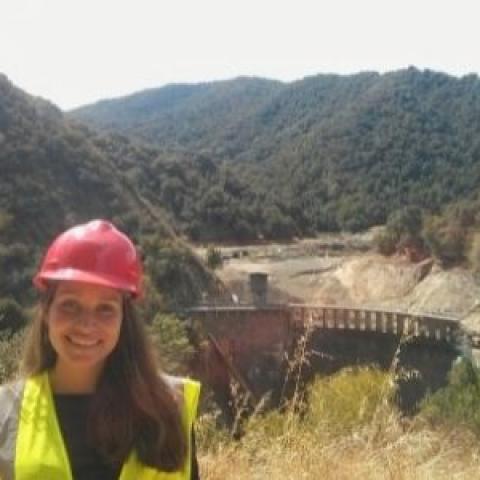Two Bren School PhD researchers, Gabriela Alberola and Timnit Kefela, have been awarded prestigious Switzer Fellowships from the Robert & Patricia Switzer Foundation. They are among twenty new Switzer Fellows for 2021.
The Switzer Fellowship supports environmental leaders who have the ability, determination, and integrity to effect positive change. The program awards highly talented graduate students from diverse academic and personal backgrounds one-year fellowships, including a $15,000 cash award, leadership training, access to the network of fellowship alumni, and further opportunities for professional development and grants. Switzer Fellows are selected for their work on the leading edge of environmental and social change through environmental science, policy, justice, and other disciplines.
Timnit Kefela's research focuses on understanding the sources, pathways, and fates of plastics in urban soils and coastal sediments. She began her research career as a botanist, where she studied plant gene function and the role of plant-microbial interactions on enhancing plant growth, promoting defense against plant diseases and abiotic stress tolerance. Timnit also led community-based initiatives to increase nutritionally dense food access and pollution remediation in New Jersey. She holds a BS in Biology with a minor in English Literature, and an MS in Biology from Rutgers University-Camden.

“I am elated to receive the Switzer Fellowship because the network's mission aligns with my personal and professional mission to foster inclusive environmental futures, center healthy urban environments of which communities like mine predominantly inhabit, and develop accessible solutions to microplastic pollution,” said Timnit, a PhD candidate in the Holden lab. “Their spirit of interdisciplinarity and centering equity as exemplified by the fellows of the past and present are necessary to meet those goals and I look forward to working with and being a part of the community.
"Timnit Kefela has identified urban plastic pollution as a missing link to solving critical issues of the global plastics environmental burden, a link that has serious implications to delivery of key ecosystem services including the societal food supply and biogeochemical processes in nutrient cycling. Her research is pivotal in showing how to quantify and identify plastic pollution as related to sources, particularly in the contexts of soil and sediments as the most complex environmental matrices," explained Professor Patricia Holden. Holden herself is a 1992 alumna of the Switzer Fellowship program. "She is leading in assessing the biodegradation potential of urban plastics in coastal sediments, and the degree to which 'green' stormwater management practices accumulate and concentrate plastics, including cigarette filter fibers, in ways that can have been relatively unconsidered for environmental impacts. Her work is essential to informing policy decisions towards reducing incoming plastic environmental burdens while addressing the toughest questions in remediating existing pollution".
"Timnit has also well established herself as an innovative champion and leader of diverse peoples in science, technology, education and math (STEM) education and research," she added. Timnit received the UC Santa Barbara Outstanding Teaching Assistant Award in 2020 for her exemplary mentorship and classroom teaching to Masters' students in several key Bren courses. "She is an accomplished teacher and scholar who fluidly expresses her expertise and knowledge not only in her research but in preparing and inspiring the next generation of environmental problem solvers."

Gabriela Alberola researches solutions to problems that impact environmentally marginalized communities in Latin America and the Caribbean. Her research focuses on how politics affect climate change adaptation processes, and how violence against environmental activists impacts environmental outcomes. Originally from Panama City, Panama, Gabriela holds a BS in Environmental Biology from the Universidad de Panamá, and her MS in Coastal and Watershed Science & Policy from CSU Monterey Bay.
"The Switzer Fellowship will help me develop skills and engage with effective networks to be successful in my work on climate change adaptation and environmental justice,” said Gabriela, PhD student in the Buntaine lab. Her research focuses on environmental politics and policy, particularly the impacts of corruption on environmental management in Latin America.
“Ms. Alberola is a rising leader who is poised to make major contributions to understanding the impacts and responses of vulnerable populations in Latin America and the Caribbean to climate change. She is building a much-needed research agenda that explains when and why efforts to adapt to the growing effects of climate change, such as greater exposure to dangerous storms and coastal inundation, are effective at protecting vulnerable populations,” commented Professor Mark Buntaine.
“She is also researching the causes, consequences, and remedies for violence against environmental activists,” he added. “Throughout Latin America, people who take a leading role in advocating for effective environmental management are often targeted for seeking change. In combination, her research agenda takes a holistic approach to understanding both the biophysical and social basis for effective adaptation to climate change and the prevention of environmental destruction."
Congratulations to the 2021 Switzer Fellows!


